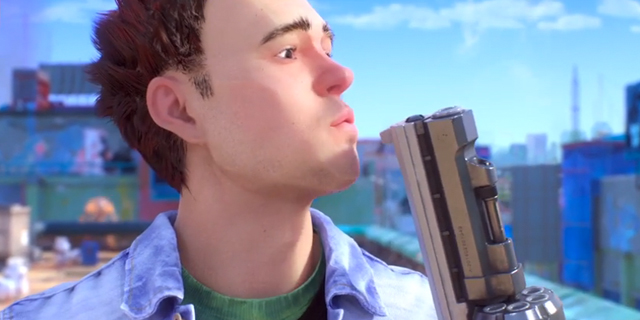
One of the biggest headline Xbox One exclusives shown off by Microsoft this week was Sunset Overdrive. The main reasons the game has been getting attention are its bright color palette and energetic gameplay. Also, it’s being developed by Insomniac Games, whose work up until this point has been almost entirely exclusive to PlayStation platforms. That’s all well and good, but there was something about the teaser trailer shown at Microsoft’s briefing this year that struck me in a very unexpected way. Not anything specifically about the game, but instead a line spoken by its protagonist:
“Can you survive the many dangers? Can you help others survive? Can you save Sunset City? Can you? For the love of God, can you? Of course you can – it’s a f–– video game.”
The most important part is the last sentence. What bothers me is not that it breaks the fourth wall; I have no problem there, considering the game’s tongue-in-cheek nature. What bothers me is that it seems to take the idea that games should be empowering as a given. Is that really a relevant standard for the direction the games industry is headed? It certainly has been the norm up until now; most games place you in the role of a super-powerful, crafty leading man we assume can solve any problem sent his way. After all, that is what is expected of the player, and the character is just an avatar for the player… right?

I believe this is the wrong approach to look at how we interact with games. This philosophy is reasonable taken on its own merits, and even more so with a game like Sunset Overdrive that aims to parody the dour tone of many modern games. But, the fact that it is so pervasive – to the point that we consider it the default – is a problem. Games do not need the player to be an unstoppable force to be engaging; in fact, some of the most engaging games ever made have put the player in a position of weakness.
When one controls a character that may not be able to handle any problem thrown their way, they are forced to think about their own flaws and shortcomings – the fragile touchstones of our humanity. Fun is not the end-all goal of video games. A game can be interesting or engaging without being fun. There is a reason why we have tragedy to accompany comedy.
The best example for this philosophy is, of course, the entire horror genre. Any good horror game emphasizes that the character you are controlling is far less capable and knowledgeable than any of the forces opposing you – forces they may not even comprehend. Some of the best horror games even intentionally make the controls difficult to master to instill that weakness into the most fundamental level of the game.
Once again, this not only makes the player feel their character is weak, but that the player themselves is weak. Reaching through the screen to connect with the player on the other side is a highly effective tactic in game design, especially when you are looking to make the player unsettled and disturbed.

Another example actually just became topical once again – in the same conference, no less. Inside, the spiritual successor to the 2010 indie hit Limbo, premiered at the show, bearing many of the same visual and design traits that made the first game so distinctive. Near-monochrome silhouettes, a nonspecific threat or villain, a large, intimidating world and a tiny character to inhabit it. These games put you in the shoes of a young boy trying to make his way through a world comprised of shadows where nothing is certain and anything can be hostile.
Withholding audiovisual information from the player is a simple and effective way to instill unease, as they are our most basic senses. They are our first line of rationale when trying to make sense of our surroundings. When we are unable to collect such information, we become frightened and unsettled. As the players and environments of these games are almost all comprised of outlines in shadow, the player never truly sees the world they are interacting with. This makes the player tense and alert to the events of the game, and is a great tool for engagement.
Games can give us experiences other than power fantasies, and be just as – if not more – effective as artistic works. Whether or not Insomniac meant the line in the Sunset Overdrive teaser to be taken seriously – or simply meant it as parody – isn’t relevant, since it still begs the question: can you survive? What if you can’t? What if you really aren’t strong, clever or fast enough? What will you do then? What does it say about all of us?



















